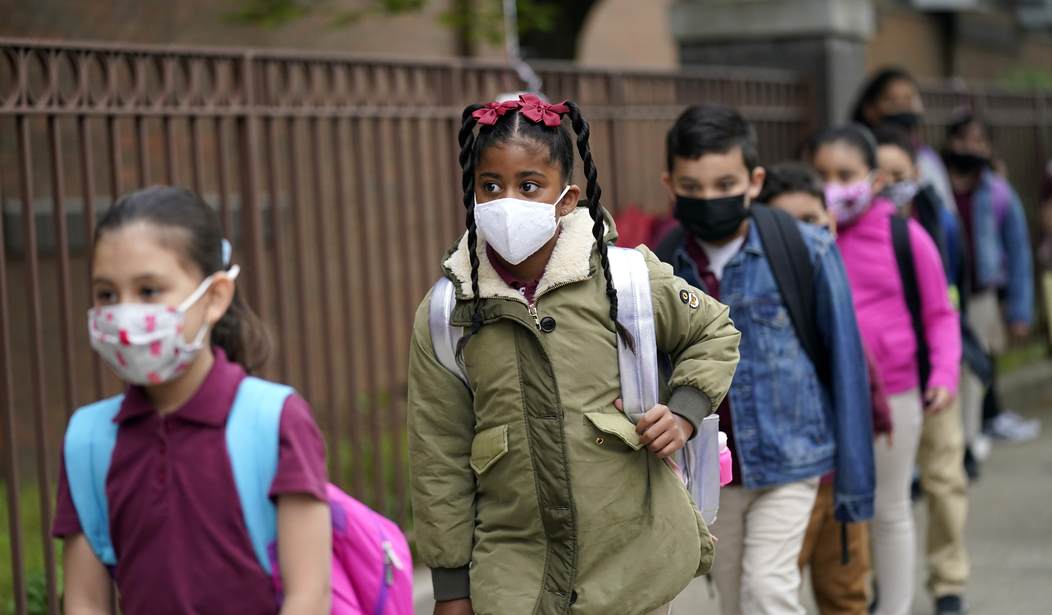As Joe Biden is getting ready to get American kids vaccinated. Part of his plan includes having the Department of Health and Human Services “conduct a national public education campaign to reach parents and guardians with accurate and culturally responsive information about the vaccine and the risks that COVID-19 poses to children.”
In other words, they’re going to launch a fear campaign to get parents to vaccinate their kids. Actually, they already have.
Ultimately, parents will have to decide whether to vaccinate their kids, should the FDA approve the COVID vaccines for kids under 12 years old. Do parents have all the facts to make an unbiased comparison of the risks and benefits? If they’re listening to the Biden administration, probably not.
Here are four things for you to consider:
1. Covid is less deadly to kids than the flu
This summer, the Wall Street Journal reported that various studies have all shown that children are at an “extremely slim risk from dying from COVID-19.” One study found that “99.995% of the 469,982 children in England who were infected during the year examined by researchers survived.” This matches CDC data that show that school-age children have a COVID recovery rate of 99.997%—better than their mortality risk from the seasonal flu. Children don’t even need to be masked, let alone vaccinated. As National Review’s Jim Geraghty said at the time, “Would we prefer kids not catch COVID-19? Sure. If they are infected, do we have to worry about any serious health consequences? In very rare cases, yes; we know which kids are most at risk because of their preexisting serious disabilities. In those cases, we can take steps to keep kids safely distanced and protected — and in some cases and ages, vaccinated.”
Vaccinating kids with underlying health conditions that put them at risk of succumbing to COVID makes more sense than vaccinating kids who are not at risk.
2. Kids are better protected from COVID than vaccinated adults
A recent study from the UK found that unvaccinated children are safer from COVID than even vaccinated adults of any age. “According to that data, an unvaccinated 10-year-old, who may look like the very picture of COVID vulnerability heading into the school year, faces a lower mortality risk than a vaccinated 25-year-old, whom we might today regard as close to safe as can be,” notes David Wallace-Wells of New York Magazine. “In England, the incidence of hospitalization among unvaccinated kids was lower than that of those vaccinated aged 18-29, and in recent weeks, the hospitalization rate among kids ages 5 to 14 has been only about one per 100,000.”
“To put it more bluntly,” he continued, “in assessing an individual’s risk of dying from covid, age appears still as important—and maybe even more important—than vaccination status.”
AMAZING report from @PHE_uk on vaccination impact on #COVID19 cases, hospitalisations and deaths in England
2 things stand out:
– Vaccines work astoundingly well
– Even unvaccinated kids are lower risk of death than fully vaccinated adults of any agehttps://t.co/E1oHhKrCCA pic.twitter.com/rUadEWusOp— Alasdair Munro (@apsmunro) September 9, 2021
In the United States, we see the same thing. As of October 6, there have been 700,952 COVID-related deaths in the United States. Of those, only 499 were kids 17 and younger.
3. Short-term and long-term side effects
As we’ve previously reported, studies suggest that there’s anywhere from a 1 in 5,000 to a 1 in 6,000 chance of myocarditis in young men who receive a second dose of an mRNA vaccine. According to Doran Fink, M.D., deputy director of the clinical side of the FDA’s Division of Vaccines and Related Products Applications, “when you look at the balances of risk versus benefit, what we really start to see is risk of myocarditis being higher [than COVID-19] in males under age 40.”
The apparent risks were high enough that the FDA rejected Pfizer-BioNTech’s COVID-19 vaccine booster for people 16 and older because of the risk of myocarditis in young males. However, it was later approved for individuals 65 and older.
Related: New COVID-19 Data Supports Ending School Mask Mandates
And that’s just one short-term side effect. Unfortunately, we don’t know the long-term side effects of the COVID vaccines. And long-term side effects from vaccines are very rare and typically occur within a couple of months of vaccination. That said, mRNA vaccines are new, and it’s possible we need more time to determine their long-term effects.
4. Natural immunity is better
Kids are overwhelmingly safe from COVID. There’s a good chance many have had COVID already but showed no symptoms. With this in mind, is it not better for them to develop natural immunity to COVID? A recent study from Emory University found that patients who have recovered from COVID “retain broad and effective longer-term immunity to the disease.” A study from the Cleveland Clinic similarly found that natural immunity was far superior to vaccination. Would you prefer endless boosters or long-term immunity?










